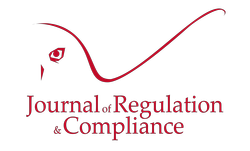Les fiches récentes
14 octobre 2021
Conférences

► Référence complète : Frison-Roche, M.A., Définition du Principe de Proportionnalité et Définition du Droit de la Compliance, in Frison-Roche, M.-A. et Rapp, L. (dir.), Compliance et Proportionnalité. Du contrôle de proportionnalité à la proportionnalité du contrôle, juges pour la Compliance, Colloque coorganisé par le Journal of Regulation & Compliance (JoRC) et la Chaire SIRIUS (IDETCOM), 14 octobre 2021.
____
📅 Lire le programme du colloque
📅 Ce colloque s'insère dans le cycle de colloques 2021 organisé par le Journal of Regulation & Compliance (JoRC) et ses partenaires autour des Buts Monumentaux de la Compliance.
____
🚧 Lire le document de travail ayant servi de base à la conférence et sur lequel réagissent deux premières discutantes
►Consulter les slides servant de base à la conférence
► Résumé de la conférence : L'usage de la Proportionnalité pour toujours limiter les pouvoirs n'est justifié que lorsqu'il s'agit de sanction. Mais dès lors qu'il ne s'agit pas de sanctions, et les sanctions ne sont qu'un outil parmi d'autres, destinées d'ailleurs à avoir peu de place dans ce Droit Ex Ante, et que l'on en revient à la nature même du Droit de la Compliance, qui s'appuie sur des opérateurs, privés ou publics, parce qu'ils sont puissants, alors utiliser la proportionnalité pour limiter les pouvoirs est dommageable au Droit de la Compliance.
Or, rien ne requiert cela. Le Droit de la Compliance n'est pas une exception qu'il faudrait limiter. C'est au contraire une branche du Droit qui porte les plus grands principes, visant à protéger les êtres humains et dont la normativité réside dans les "Buts Monumentaux" : détecter et prévenir les crises systémiques majeurs futures (financières, sanitaires, climatiques).
Or, le principe de Proportionnalité est "pas plus de pouvoirs qu'il n'est nécessaire, autant de pouvoirs qu'il est nécessaire".
La seconde partie de la phrase est autonome de la première : il faut la saisir.
Le Politique ayant fixé ses Buts Monumentaux, l'entité, notamment l'entreprise doit avoir, même tacitement, "tous les pouvoirs nécessaires" pour les atteindre. Par exemple le pouvoir de vigilance, le pouvoir d'audit, le pouvoir sur les tiers. Parce qu'ils sont nécessaires pour remplir les obligations que ces "opérateurs cruciaux" doivent exécuter car ils sont "en position" de le faire.
Ainsi au lieu de limiter les pouvoirs, la proportionnalité vient supporter (au sens anglais) les pouvoirs, les légitimer et les accroître, pour que nous ayons une chance que notre avenir ne soit pas catastrophique, peut-être meilleur.
En cela, le Droit de la Compliance, dans sa définition riche, aura lui-même enrichi le principe de proportionnalité.
____
► La conférence et le document de travail servent de base à un article dans un ouvrage :
📕 dans sa version française Les Buts Monumentaux de la Compliance, dans la collection 
📘 dans sa version anglaise Compliance Monumental Goals , dans la collection 
_________
10 octobre 2021
Compliance : sur le vif
<iframe src="https://www.linkedin.com/embed/feed/update/urn:li:ugcPost:6852886302531051520" height="853" width="504" frameborder="0" allowfullscreen="" title="Post intégré"></iframe>
9 octobre 2021
Compliance : sur le vif
<iframe src="https://www.linkedin.com/embed/feed/update/urn:li:ugcPost:6852125639571472384" height="1385" width="504" frameborder="0" allowfullscreen="" title="Post intégré"></iframe>
7 octobre 2021
Compliance : sur le vif
<iframe src="https://www.linkedin.com/embed/feed/update/urn:li:share:6851756203249295361" height="1249" width="504" frameborder="0" allowfullscreen="" title="Post intégré"></iframe>
5 octobre 2021
Compliance : sur le vif

<iframe src="https://www.linkedin.com/embed/feed/update/urn:li:share:6851222057666002944" height="1429" width="504" frameborder="0" allowfullscreen="" title="Post intégré"></iframe>
3 octobre 2021
Compliance : sur le vif
<iframe src="https://www.linkedin.com/embed/feed/update/urn:li:ugcPost:6850343719166607360" height="710" width="504" frameborder="0" allowfullscreen="" title="Post intégré"></iframe>

Mise à jour : 25 septembre 2021 (Rédaction initiale : 25 mars 2021 )
Publications

 ► Référence complète : Frison-Roche, M.-A., Instituer l'insécurité juridique comme principe, outil de prévention des crises systémiques catastrophiques totales, document de travail, mars et septembre 2021.
► Référence complète : Frison-Roche, M.-A., Instituer l'insécurité juridique comme principe, outil de prévention des crises systémiques catastrophiques totales, document de travail, mars et septembre 2021.
____
► Ce document de travail fait suite à deux précédents documents de travail, réalisés pour le colloque qui s'est tenu à la Cour de cassation le 22 mars 2021.
Le premier avait été conçu et en partie réalisé longtemps avant sa tenue pour traiter le sujet selon les canons habituels attendus ;
Le second a été élaboré le veille de sa tenue sur 4 cas car la disparition de mes serveurs en raison d'un incendie, ayant également touché les copies de ceux-ci ne me permettait pas autre chose, les organisateurs m'ayant demandé de maintenir pourtant ma participation, ce dont je les remercie 📎!footnote-2299.
Le présent document de travail a été élaboré après la tenue du colloque afin que les organisateurs de ce colloque, au thème si aventureux, ne pensent pas qu'ils ne pouvaient pas compter sur moi.
Ce document de travail vise à dépasser ces avanies et à opérer la connexion du sujet pour lequel une contribution m'a été demandée (la crise économique) avec le sujet plus général qui me retient par ailleurs : la construction de la nouvelle branche qu'est le Droit de la Compliance, pourquoi le faire et comment le faire.
____
Introduction : Comme à tous, ce sujet de "L'insécurité juridique" me pose difficulté. Parce que, n'étant pas grand personnage solitaire affrontant l'inconnu, comme tous les autres je voudrais plutôt la sécurité que l'insécurité, et tous les mots qui ne commencent pas par une négation : je voudrais le connu plutôt l'inconnu, je voudrais être comprise qu'incomprise, et ce n'est plus par confort que par urgence morale je voudrais vivre dans un monde juste plutôt que dans un monde injuste. C'est d'ailleurs pour cette dernière raison que je vais affronter l'aventure de l'Insécurité juridique comme principe premier, et non pas comme exception au principe de la Sécurité juridique 📎!footnote-2300.
Cet ajout du "in" signale paradoxalement un retranchement : le "in" montre ce qui manque, comme le monde blessé qu'est le monde injuste. Me voilà invitée à traiter un sujet par avance abîmé, car l'insécurité juridique c'est déjà comme une agression : un monde amputé de sa sécurité, comme c'est désagréable.
C'est encore plus vrai pour "l'insécurité juridique". En effet, la notion fait face à la "sécurité juridique", cette sorte d'apport spécifique que le Droit offre au monde. La "sécurité juridique" est aujourd'hui comme un Totem, qui serait indissociable du Tabou de l'Insécurité. Dans le monde juridique épuisé dans lequel nous ne serions plus aptes qu'à proposer quelques notions procédurales, surtout pas de notions substantielles car immédiatement taxées d'être trop politiques 📎!footnote-2277, la "sécurité juridique" qui n'est qu'une notion procédurale en ce qu'elle permet simplement que tout soit prévisible, que demain soit comme aujourd'hui, lequel est d'ailleurs comme était hier, est promue au rang normatif le plus haut. Les travaux abondent, les hymnes d'approbation sont unanimes. On ne demanderait plus que cela au système juridique, mais cela on l'exige : le droit serait une procédure qui garantirait la prévisibilité de la réglementation 📎!footnote-2276 et accroîtrait ainsi la solidité des projets particuliers que nous avons, les uns et des autres et, grâce au pouvoir du Droit de rendre réel ce qu'il assure, nous savons que nos projets pourront tenir demain dans les mêmes termes choisis hier, puisque le Droit nous l'a promis.
La sécurité juridique, parce que les systèmes juridiques n'auraient plus que cela à offrir, revendiquant par ailleurs leur neutralité et se rejoignant donc sur cette constance, cette cohérence, et cette confiance produites par cette sécurité, est notre nouveau doudou.
A cela, l'on apporte nuances dans les modalités, en soulignant que les circonstances changeantes de la vie exigent un peu de flexibilité, que le pragmatisme et des situations concrètes et particulières qui sans cesse varient impliquent de prévoir dès aujourd'hui que demain le contexte aura changé : il faut organiser de la prévisibilité dans le changement. De cela, le Droit souple s'en charge, les lignes directrices étant les nouvelles voies romaines qui nous montreront le chemin. Sécurité et flexibilité, dans un pragmatisme qui voit dans tout principe substantiel un signe de rigidité, voilà notre nouveau mantra.
L'insécurité juridique est ainsi notre Tabou, dont les admissions justifiées seraient autant d'hommages rendus au Totem de la sécurité juridique, Totem et Tabou se renforçant toujours. Il y aurait donc imperfection du système juridique si l'on haussait l'insécurité au rang de véritable principe. C'est pourquoi lorsqu'on fait l'effort de parler d'insécurité juridique, on semble ne le faire que sur le mode de l'exception : l'insécurité juridique, cela serait ce qu'il est admissible de supporter comme exception légitime au principe de la sécurité juridique 📎!footnote-2275.
L'on aura donc tendance à traiter de l'insécurité juridique comme une sorte de principe supportable lorsque quelque chose justifie qu'on porte atteinte au véritable principe premier qu'est la Sécurité juridique. C'est ailleurs ainsi le plus souvent qu'on l'aborde . Ce n'est donc pas le traiter comme un véritable principe, juste comme une exception supportable.
Voilà pourquoi l'on m'a demandé d'examiner si l'insécurité juridique était supportable, admissible, lorsqu'il y a crise économique. Sans doute parce que lorsqu'il y a crise économique, alors tant pis les principes doivent un peu baisser pavillon et l'on fait avec les moyens du bord en admettant des exceptions, bien qu'avec beaucoup de réticences et de regrets 📎!footnote-2304... Puisque c'est l'hypothèse évoquée, je la suivrai volontiers, et dans un premier temps resterai dans cet enclos-là, mais c'est aller dans l'idée que l'insécurité juridique ne pourrait être qu'une exception faite au principe de la sécurité juridique parce qu'il faut que tout ne change pas vraiment : la crise ne rebat les cartes qu'un temps, le temps de la crise, mais lorsque la crise est passée l'on en revient au normal et à ce qui est bien, à savoir le "vrai principe", celui de la constance et de l'inchangé. Car il n'est supportable de "bafouer" la sécurité juridique qu'un temps 📎!footnote-2303. L'insécurité juridique serait donc ce qui intervient lorsqu'une crise économique s'ouvre afin d'aider à l'efficacité de sa gestion et pour sortir de cette crise. Cela et pas davantage (I).
L'insécurité juridique n'aurait donc qu'un temps, parce que par nature la crise elle-même n'a qu'un temps. La fin de la crise, la fin des problèmes et d'une situation anormale feraient disparaître le principe d'insécurité juridique, lequel serait donc un principe pathologique.
Mais ce n'est pas parce que cette description semble partagée par beaucoup que ses prémisses soient exacts. En effet, la "crise" est-elle si exceptionnelle que ce qui justifie que l'insécurité juridique, qui permet d'aider à sa résolution, le soit aussi ? Si l'on constate plutôt que la crise est non seulement notre "ordinaire", et qu'en plus notre "ordinaire catastrophique" est "prévisible", voire virtuellement déjà là, et qu'en plus dans le futur, ce qui risque d'arriver est une crise catastrophique totale qui pourrait bien être définitive dans ses effets (ce qui enlève à la crise sa nature temporaire et le retour au "vrai principe" également), alors le principe exceptionnel, cantonné dans la crise, doit sortir de l'hypothèse de celle-ci pour venir pleinement dans le Droit présent afin d'empêcher que se réalise cet ordinaire catastrophique.
Oui, regardons vers le futur : ne sont-ce pas de monumentales crises qui sont devant nous ? Et l'enjeu n'est-il pas d'adopter des principes premiers pour qu'elles n'adviennent pas ? S'il en est ainsi, alors l'absence de changement, la constance et le prévisible, c'est-à-dire le principe même de la Sécurité juridique, si choyé, n'est-ce pas ce qui fait obstacle à la prévention de l'advenance des crises économiques qui nous menacent ? Certes c'est sans doute une crise sanitaire et une crise écologique et climatique qui nous sont devant nous, mais de la même façon la crise économique de 2020 n'est elle-même qu'un accessoire de la crise sanitaire mondiale, prémisses de ce qui pourrait arriver.
Si nous sommes dans cette situation mondiale alors, ce n'est pas une conception procédurale des principes qu'il faut retenir, mais une conception politique. De la même façon, dans cette perspective ce n'est pas en terme d'exception, de "principe exceptionnel" mais bien en terme de principe premier qu'il faut penser l'Insécurité juridique, c'est-à-dire en terme d'éveil et d'aventure, car demain pourrait n'être pas du tout comme aujourd'hui. Seul le principe inverse de l' "Insécurité juridique" pourrait alors exprimer la volonté d'y répondre (II).
_____
► Lire ci-dessous les développements du document de travail ⤵
23 septembre 2021
Conférences

 Référence complète : Frison-Roche, M.A., Ne jamais se passer des juges et des avocats dans le Droit de la Compliance, in Frison-Roche, M.-A., Morel-Maroger, J. et Schiller, S. (dir.), Quels juges pour la Compliance, Colloque coorganisé par le Journal of Regulation & Compliance (JoRC) et le Centre de recherches CR2D de l'Université Dauphine PSL, salle Raymond Aron, 23 septembre 2021.
Référence complète : Frison-Roche, M.A., Ne jamais se passer des juges et des avocats dans le Droit de la Compliance, in Frison-Roche, M.-A., Morel-Maroger, J. et Schiller, S. (dir.), Quels juges pour la Compliance, Colloque coorganisé par le Journal of Regulation & Compliance (JoRC) et le Centre de recherches CR2D de l'Université Dauphine PSL, salle Raymond Aron, 23 septembre 2021.
____
📅 Lire le programme de ce colloque
____
✏️Avait été élaboré un document de travail sur le thème "Le rôle du Juge dans le Droit de la Compliance" pour servir de base à cette intervention : lire le document de travail.
Sur le moment, pour la raison détaillée ci-dessous, j'ai préféré utiliser le temps imparti à l'introduction du colloque pour développer plutôt ce qui devait être qu'un élément d'ouverture et en faire l'objet entier de mon intervention : "Ne jamais se passer des juges et des avocats dans le Droit de la Compliance".
Car avant d'analyse le rôle des juges, encore faut-il qu'ils soient dans le système de Compliance ; or cela nous paraît acquis, mais cela ne l'est pas.
► Résumé de la conférence : En raison notamment de la présence nombreuse d'étudiants et du fait que il y a longtemps à mon arrivée à Dauphine j'avais créé avec Martine Lombard un Master de Droit économique dans lequel j'avais inséré un cours que j'assurais de Droit processuel économique, puisqu'il s'agissait de faire un "rapport introductif général", au moment de le faire j'ai donc préféré partir de plus loin et de centrer le propos sur autre chose que "le rôle du juge dans le Droit de la Compliance", à savoir la question même de "la présence du juge et des avocats dans le Droit de la Compliance".
Cette question de leur présence ou de leur absence, parce qu'ils seraient inutiles, voire néfastes à l'efficacité de la Compliance, soit les juges, soit les avocats, soit les deux ensemble, est en effet le préalable à la réflexion de "quels juges pour la Compliance ?" car si l'on penser la Compliance exclusivement par l'Ex Ante et l'efficacité, comme on le fait souvent en Occident à travers l'intelligence artificielle ou en Chine dans un système de surveillance et de d'efficacité économique, technologique et politique, il n'y a ni juge, ni avocat. C'est donc à ce préalable que j'ai consacré mon temps de parole, reportant à la publication l'ensemble des analyses que j'avais préparées sur "Le rôle du juge dans le Droit de la Compliance", auxquelles l'on peut se reporter en consultant le travail préparatoire.
Il est en effet impératif d'avoir toujours à l'esprit la nécessité de ne pas jamais exclure les juge des systèmes de Compliance, bien que cela puisse être concevable puisque ce sont des mécanismes Ex Ante, qui visent souvent par nature en empêchant le procès (exemple de la Convention judiciaire d'intérêt public), car quand il y a un juge les mécanismes processuels y sont associés et la puissance du Droit de la Compliance ne tourne pas mal.
Or le Droit de la Compliance est le Droit de l'avenir, celui qui va se saisir des immenses défis à régler aujourd'hui pour demain et c'est non pas à partir de la loi dite "Sapin 2", qui n'est qu'un exemple mais à partir de deux énormes sujets "monumentaux" que sont d'une part les données et d'autre part le climat que le Droit de la Compliance se construit, avec les moyens qui sont requis. Mais pour que la règle "tous les moyens nécessaires pour les fins", qui avait déjà tendance à régir le Droit de la Régulation, dont le Droit de la Compliance est l'exponentiel prolongement, n'emporte pas tout, il faut des avocats. Car les avocats contredisent. Et demandent. Demandent aux juges et portent les actions des personnes ordinaires pour les droits subjectifs de celles-ci soient concrétisés. Comme l'affirma pendant la thèse qu'il écrivit pendant la Seconde Guerre Mondiale Motulsky afin d'inventer après elle le "Droit processuel".
____
Le document de travail, dont la teneur n'a donc pas été exploité lors de la conférence, sera la base d'un article dans la publication de l'ouvrage :
📕 dans sa version française La juridictionnalisation de la Compliance, dans la collection 
📘 dans sa version anglaise Compliance Jurisdictionalisation, dans la collection 
___
📅 Ce colloque s'insère dans le cycle de colloques 2021 organisé par le Journal of Regulation & Compliance (JoRC) et ses partenaires autour de la Juridictionnalisation de la Compliance.
📕 Les interventions ont servi de première base à la réalisation d'un titre dans l'ouvrage dirigé par Marie-Anne Frison-Roche, dont la version française, La juridictionnalisation de la Compliance, est co-édité par le Journal of Regulation & Compliance (JoRC) et Dalloz.
📘 Elles ont été de la même façon la première base pour la version anglaise de l'ouvrage, Compliance Juridictionalisation, co-édité par le Journal of Regulation & Compliance (JoRC) et Bruylant.
_________